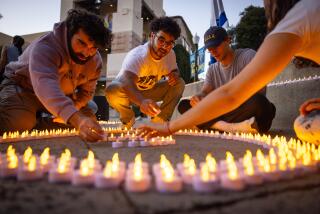Holocaust Survivors Honored in Remembrance Day Ceremony
Sixty years after the liberation of the Nazi death camps, some 2,000 people, many of them schoolchildren, gathered Thursday in Los Angeles’s Pan Pacific Park to mark Holocaust Remembrance Day.
As with other recent Holocaust memorials, Thursday’s was suffused with a sad urgency as the Jewish victims who survived the death camps dwindle in number.
Nathan Shapell, 83, an Auschwitz survivor who helped build the Holocaust monument at the park, said Holocaust programs are a must.
They not only honor 6 million Jewish dead, but they play a vital role in educating future generations, he said. “The children, the children, the children are the key,” said Shapell, who was born in Poland. “Little by little, you have to guide them, explain what happened, and, little by little, they get it.”
A few dozen survivors were honored guests at the gathering, including a contingent from Israel.
Sophie Hamburger, 84, now of West Los Angeles, escaped from a 1945 death march from Auschwitz-Birkenau in Poland.
“I just ran away,” she recalled. “I wanted to be shot in the back and not to see it.”
Sima Zonder, 73, came to the memorial from Tel Aviv. She was with the group from Cafe Europa, a Holocaust survivors’ organization founded by the Jewish Family Service of Los Angeles.
Born in Poland, Zonder was 9 years old when she hid with her mother in a forest. They were spotted by pro-German militia, and her mother was shot and killed. Zonder was shot in the shoulder. She survived her wound, and the war, with the help of local Czechs.
At Cafe Europa in Tel Aviv, she said, survivors are at ease in the company of others who experienced the indescribable. “We don’t even talk so much about it,” she said. “The main thing is the warmth, the friendliness.”
Jona Goldrich, 77, chairman of the Los Angeles Holocaust Monument, is distressed that so few young people know about the Holocaust. “We’re teaching in school about Julius Caesar, about Hannibal, about nonsense,” he said. “You shouldn’t graduate from high school without knowing about the Holocaust.”
Part of the problem is that the truth is so horrific that it is hard to talk about.
“Sometimes when I go to sleep at night, I think I’m making it up,” Goldrich said of the images that haunt him.
“I didn’t have a childhood,” said Israeli Avraham Lowy, born in Slovakia. “What I remember from my childhood is they are running after me.”
Now 70, Lowy was separated from his parents in 1943 but local peasants looked after the boy and his adopted sister.
Sixty years ago, his mother staggered back from the camp at Ravensbruck, Germany, weighing 70 pounds. His father also survived a camp. But Lowy and his sister had somehow become separated and she had disappeared, he recalled with tears in his eyes.
“I am still looking for my sister. That’s one reason I am here.”
Her name is Erna Muhlstein. She was born in Krakow, Poland, about 1938.
More to Read
Sign up for Essential California
The most important California stories and recommendations in your inbox every morning.
You may occasionally receive promotional content from the Los Angeles Times.










